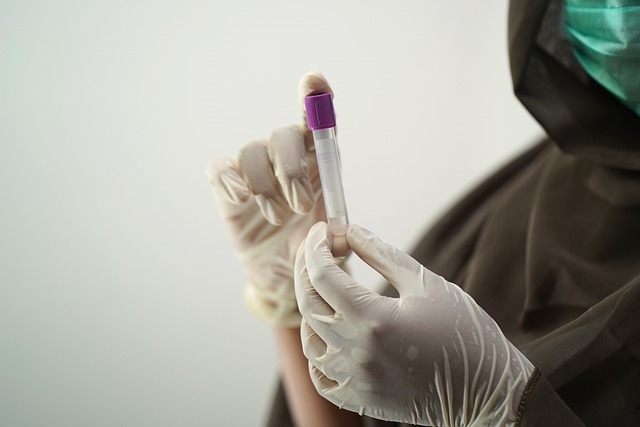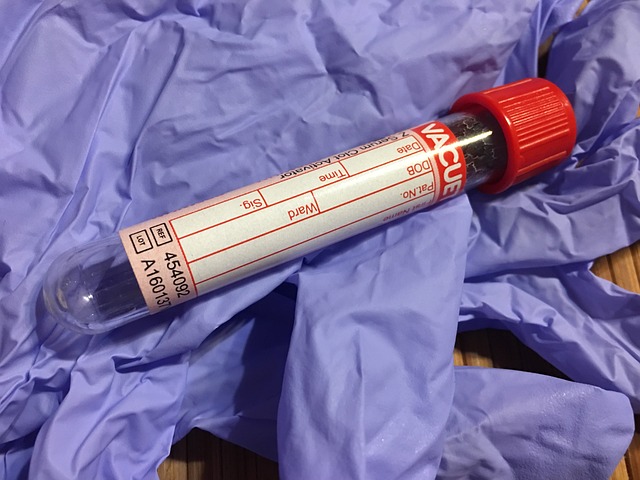In the UK, iron deficiency anemia (IDA) is a significant health concern, particularly among individuals with diabetes due to increased iron needs and potential inflammation. The article outlines the importance of blood tests, such as diabetes blood tests, for early detection and management of IDA. Key diagnostic tools include serum ferritin, transferrin saturation, hemoglobin markers, and a complete blood count (CBC), which together provide comprehensive information on iron status and its impact on health. In the UK healthcare system, these tests are accessible through a full blood count (FBC) as an initial screening step for identifying anemia and potential IDA. Early intervention, facilitated by routine monitoring of iron levels in diabetics, is crucial for preventing fatigue, weakness, and other complications associated with anemia. The article emphasizes that regular blood tests are a cornerstone of healthcare management for diabetes in the UK, ensuring timely treatment and enhancing overall well-being by addressing the complex interplay between IDA and diabetes.
iron deficiency anemia remains a prevalent health concern, with its accurate diagnosis pivotal for effective management. In the UK, blood tests are instrumental in pinpointing this condition, offering a window into one’s iron levels and overall health status. This article delves into the nuances of iron deficiency anemia, the significance of blood testing within the context of the UK’s healthcare system, and how it intersects with conditions like diabetes as per the Diabetes Blood Test UK guidelines. Understanding these aspects empowers individuals to navigate their health journey confidently.
- Understanding Iron Deficiency Anemia and Its Impact on Health
- The Role of Blood Tests in Identifying Iron Deficiency Anemia
- Navigating Iron Deficiency Anemia Testing in the UK: A Comprehensive Guide to Blood Tests and Diagnosis
Understanding Iron Deficiency Anemia and Its Impact on Health

Iron deficiency anemia is a condition characterized by insufficient iron levels in the body, leading to an inadequate number of healthy red blood cells and potentially low hemoglobin. This can result in various health issues, including fatigue, weakness, and shortness of breath. The importance of diagnosing iron deficiency anemia early cannot be overstated, as timely treatment is crucial for maintaining overall well-being. In the UK, healthcare professionals often employ diabetes blood tests as a point of access to screen for iron deficiency due to the shared risk factors, such as dietary habits and potential gastrointestinal issues that can affect both conditions. These tests measure serum ferritin levels, which serve as an indicator of body iron stores, and other markers like transferrin saturation and hemoglobin. Identifying iron deficiency promptly allows for targeted interventions, typically involving dietary adjustments or iron supplementation. For individuals with diabetes in the UK, regular monitoring is essential, not only for glycemic control but also to detect and address iron deficiency, thus preventing associated health complications. Understanding the significance of iron in maintaining health and recognizing its deficiency are vital steps in the management of anemia and the promotion of general well-being, particularly within the context of diabetes management in the UK.
The Role of Blood Tests in Identifying Iron Deficiency Anemia

In the diagnosis and management of iron deficiency anemia, blood tests play a pivotal role. The primary test used to assess iron status is the serum ferritin test, which measures the level of ferritin in the blood, a protein that stores iron in the body. This test is particularly useful as it can detect both functional iron deficiency and depleted iron stores. Additionally, a complete blood count (CBC) is conducted to determine if anemia is present. CBC provides data on red blood cell indices which can indicate whether there is microcytic hypochromic anemia, often associated with iron deficiency. Other tests include serum iron, transferrin saturation, and total iron-binding capacity (TIBC), all of which offer a comprehensive picture of the body’s iron handling. These tests are essential for early detection and treatment, facilitating better health outcomes. In the UK, diabetes management often involves monitoring various blood parameters, including those related to iron levels, as diabetics are at a higher risk of anemia due to increased iron requirements and potential chronic inflammation. Thus, the inclusion of iron-related blood tests in routine check-ups can be vital for individuals with diabetes, ensuring that iron deficiency anemia is identified and addressed promptly. Blood tests for iron deficiency anemia are not only diagnostic but also a critical component of the overall health management strategy, particularly within the context of diabetes management in the UK.
Navigating Iron Deficiency Anemia Testing in the UK: A Comprehensive Guide to Blood Tests and Diagnosis

In the UK, iron deficiency anemia is a common condition that can be effectively diagnosed through a series of blood tests. These tests are readily available and form the cornerstone of diagnosis and management of anemia. The first step in the diagnostic process typically involves a full blood count (FBC), which measures the levels of haemoglobin, red blood cells, white blood cells, and platelets in your blood. If iron deficiency is suspected based on the FBC results, further tests such as serum ferritin and serum transferrin saturation are conducted to confirm the diagnosis. These tests provide a clear picture of your body’s iron stores and its ability to utilize iron from your diet. It’s crucial for individuals, particularly those with risk factors like gastrointestinal disorders, frequent blood donation, or a diet low in iron, to be aware of these testing procedures. Early detection and treatment are key to preventing the progression of anemia and its associated complications, which can include fatigue, weakness, and increased risk of infections. For those with diabetes, regular monitoring of iron levels is equally important due to the heightened risk of anemia, as well as the impact of anemia on blood sugar control and vice versa. Thus, understanding the process of iron deficiency anemia testing through blood tests is essential for individuals in the UK to maintain their overall health, especially when considering the interplay with conditions like diabetes.
In conclusion, iron deficiency anemia is a prevalent condition that can significantly affect one’s health. The United Kingdom’s healthcare system provides robust support for individuals through blood tests, which are pivotal in diagnosing this condition accurately and timely. These tests, readily accessible across the nation, enable healthcare professionals to pinpoint iron deficiency with precision, facilitating tailored treatment plans. It’s integral for those at risk, including diabetics who may have unique health considerations, to engage with the NHS for regular diabetes blood test UK screenings as part of their overall health maintenance strategy. With timely diagnosis and appropriate management, individuals can effectively overcome iron deficiency anemia and its associated health challenges.
